HATE THE MUSICAL, BUT LOVE, LOVE, LOVE THE PRODUCTION
Whether you love or hate the musical version of The Color Purple, no one, and I mean no one, can or will deny that this is one of the finest productions ever staged in a small theater in Los Angeles. Director Michael Matthews has taken a turkey of a musical (more on that later for those who want the good news first), trimmed the cast of 33 down to 17 (still a huge number for the tiny thrust at the Celebration), brought on casting director Jami Rudofsky and assembled the most jaw-dropping assemblage of wicked-ass talent around. Seriously, there’s not a clunker in the bunch.
Your eyes will bug out when you see the perfectly executed choreography by the dazzling Janet Roston; that the giant cast doesn’t implode upon tricky dancing and innumerable scene and costume changes is nothing short of miraculous. Sound designer Cricket S. Myers had her hands full on this one, and Matthews was wise to bring her on board, as actors had to compete with the luscious Gregory Nabours and his jamming, tightly-lead, tiny orchestra. Naila Aladdin Sanders’ costumes are painstakingly authentic, down to the sweat stains on the field hand’s shirts, and the wig and makeup design by Michael Iran Leon must somehow be awarded at the end of the year.
Cesili Williams plays the central figure of Celie with warmth, vulnerability and power; she knocks her eleven o’clock number (“I’m Here”) out of the park, even though the ditty – “Take a deep breath, Throw my shoulders back” – is ridiculously placed since she already broke out of her introverted shell scenes before. But all of Act II is a mess. In fact, it was no doubt easier to abolish slavery than it would be to fix the horrendous second act. (Oops, sorry – more on that later.)
Constance Jewell Lopez wrings every bit of humor and pathos imaginable out of the stalwart character of Sophia, who takes a pre-feminist era stance against the opprobrious, bullying men of the Deep South; however, “Any Little Thing,” her second act duet with husband Harpo (Terrance Spencer), is a mindless, unfunny song about fooling around that murders any possibility for the brilliant story to resonate, especially when the mean Mister (the always spot-on Michael A. Sheppard) interrupts the number, effectively giving away the tear-jerker surprise of an ending. Why in the world would librettist Marsha Norman’¦damn, apologies, more on that later.
La Toya London is so vividly scrumptious as the speakeasy chanteuse Shug Avery that you may have to control yourself from hopping into her bubble bath. It’s no wonder that she arouses lesbian desire and true love in Celie – the one element of the show that qualifies it as an entry in Celebration Theatre’s gay-themed, I mean, LGBTIQQ2SA-themed line-up (NO more on that ridiculous, politically-correct, alphabet soup acronym). It’s a shame that Shug’s blues number, “Push Da Button,” is less of a song and more of a set-up for some insanely spectacular dancing, when it could have been’¦Rats! Off-track again.
How does one single out seventeen distinct, triple-threat personalities on stage? Every performer is marvelous, but will you, dear reader, read them all if listed? Let’s leave it at mentioning the hysterical Niketa Calame as the simple-minded Squeak and Charls Sedgwick Hall as mean ol’ Ol’ Mister. Oh what the heck, the rest of the cast are Sixx Carter, Kelly M. Jenrette, Corey Jones, Akula Lymon, Lorie V. Moore, Jacquelin L. Schofield, Na’Kia Bell Smith, Jonathan Thompkins, Janet Washington, and Brittney S. Wheeler. Well done, all!
And now, about the musical.
Alice Walker’s epistolary, symbol-filled, Dickensian and controversial novel The Color Purple is a dark and honest look at the cycle of slavery in the black community: a slave-born father abuses his free son – referred to as Mister – who in turn enslaves and batters Celie, a woman who remains silent to her situation; meanwhile, her missionary sister Nettie escapes the South’s indignities only to be confronted in Africa by a village’s black hierarchy and the black-on-black violence which is beset upon them by white corporations.
With grace and humor, Walker’s captivating, well-drawn characters struggle with issues of self-respect and self-expression (including the aforementioned lesbianism). Celie is motivated by the free-thinking women in her sphere, ultimately experiencing a freedom that the Emancipation Proclamation alone could not grant her. The somewhat neat and tidy ending (not unlike Dickens’ Nicholas Nickleby), is thoroughly satisfying because Walker first thoroughly and harshly presents a disturbing picture of abusive men (hence, the novel’s controversy); what begins as brutal circumstances for the female characters – rape, domestic violence, servitude – ends as a feminist celebration and we are inspired by the resilience of the human spirit.
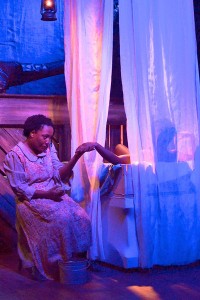 Not so in the 2005 musical, which skirts and softens the upsetting cheerlessness of Walker’s novel, siding more with the gratifying sentimentality of Spielberg’s lush 1985 film version. (Oprah, who received an Academy Award nomination for her portrayal of Sophia, was a major backer of the musical.) While Spielberg’s brand of Americana didn’t always coincide with Walker’s drab vision, he nonetheless managed to balance some of the screenplay’s improbabilities with his ravishing style and stirring sensibility.
Not so in the 2005 musical, which skirts and softens the upsetting cheerlessness of Walker’s novel, siding more with the gratifying sentimentality of Spielberg’s lush 1985 film version. (Oprah, who received an Academy Award nomination for her portrayal of Sophia, was a major backer of the musical.) While Spielberg’s brand of Americana didn’t always coincide with Walker’s drab vision, he nonetheless managed to balance some of the screenplay’s improbabilities with his ravishing style and stirring sensibility.
However, the musical actually highlights its own improbabilities. From the start, we are introduced to a sassy, “Oh, no she di’n’t!” Greek Chorus – made up of gossipy, attitude-drenched, revivalist Church Ladies – that comments with self-pleasing humor on poor Celie’s existence. Devices such as this ensure that the musical veers more towards the tone of Ain’t Misbehavin’ than that of Walker’s novel. We are robbed of the chance to tangibly experience Celie’s unimaginable torment as the audience whoops and hollers with glee (in the small space at the Celebration, one spectator actually attempted to “high-five” one of the bubbly chorus).
In an early scene, when Celie’s second child is stolen from her papa, the very man who impregnated her, the 14-year-old girl isn’t written a searing ballad to heighten the emotional moment; instead, she sings a truncated prayer of hope that “Somebody Gonna Love You.” It is one of innumerable missed heart-wrenching moments in the musical and smacks of a creative team that worried they might alienate and depress their audience if they took their subject matter too seriously.
What, then, explains the respectable length of the Broadway run, a decently attended national tour, and some viewers wiping away ebullient tears at the Celebration Theatre? It’s a damn good story packed with colorful characters, more than worthy of musicalization. The problem is that tremendously important pieces of information are hurled at us with the speed of a Tennessee tornado, ensuring that very few moments actually land. (Case in point: the shockingly limp Act I ending when Celie discovers that Nettie is alive in Africa.)
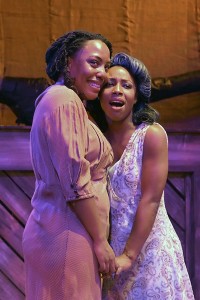 If this was an out-of-town tryout, I’d keep the story but say “’Night, Mother” to the book writer Marsha Norman, who penned an equally stultifying book for The Secret Garden (1991). (Celebration Theatre’s Purple inspires the exact same sentiment offered to Chance Theater’s revival of Garden: “Baffling musical gets the treatment it doesn’t deserve.”)
If this was an out-of-town tryout, I’d keep the story but say “’Night, Mother” to the book writer Marsha Norman, who penned an equally stultifying book for The Secret Garden (1991). (Celebration Theatre’s Purple inspires the exact same sentiment offered to Chance Theater’s revival of Garden: “Baffling musical gets the treatment it doesn’t deserve.”)
Instead of evocative storytelling and detail, Norman’s book contains snippets of the novel’s best moments, as if we are watching Stereopticon Slides of someone else’s adventure. Even with the shoddy construction, she has quite an ear for dialogue, retaining some of the best lines from the book, and occasionally intertwining events imaginatively. However, there are far too many times when she unnecessarily indicates future moments and rehashes previous moments. It’s a dispiriting adaptation.
This is the theater, not a Viewmaster.
I would also have given the pink slip to the three pop-hit song writers who – between them – had never written a musical. No wonder many of the songs by Brenda Russell, Stephen Bray and Allee Willis sound like eighties R&B: their credits list nothing but top-ten songs for recording stars (Willis, who wrote the infectious theme from Friends, was one of SIX writers on the disastrous jukebox musical Hot Feet). Their eclectic styles jump about, caught up in the same twister as the story: African rhythms, blues and forgettable attempts at pop ballads all land with a thud along with the show’s other detritus. More often than not, the curtailed and choppy songs actually interrupt the narrative’s flow. To be fair, one (perhaps two) B-side ballads are good enough for maybe Peabo Bryson to cover.
Now that that’s out of my system, may I offer a prayer that the brilliant Michael Matthews (who will most likely nab not just the nomination, but an actual Ovation Award this year) will soon be offered the opportunity to delve into some seriously good projects. If he can take The Color Purple and turn it into a rainbow, I can only imagine what this Golden Boy of L.A. Theater would create with some serious literature. Here’s your visionary, Theater World. Don’t make me beg.
photos by Barry Weiss
The Color Purple
Celebration Theatre
7051 Santa Monica Blvd. in Hollywood
ends on May 26, 2012
for tickets, call 323.957.1884 visit Celebration
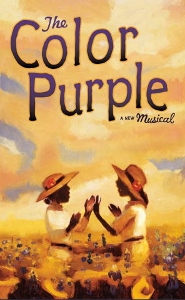
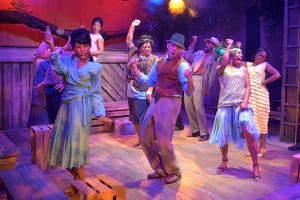
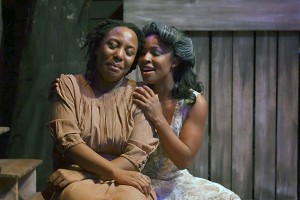
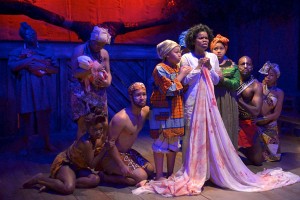
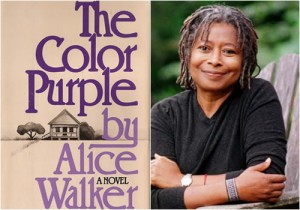


{ 1 comment… read it below or add one }
Lovely review! You made several fair points about the musical’s deficiencies. But what a cast, crew and production! I loved every minute of this close-to-three-hour buoyant show that works so well in Celebration’s intimate space.